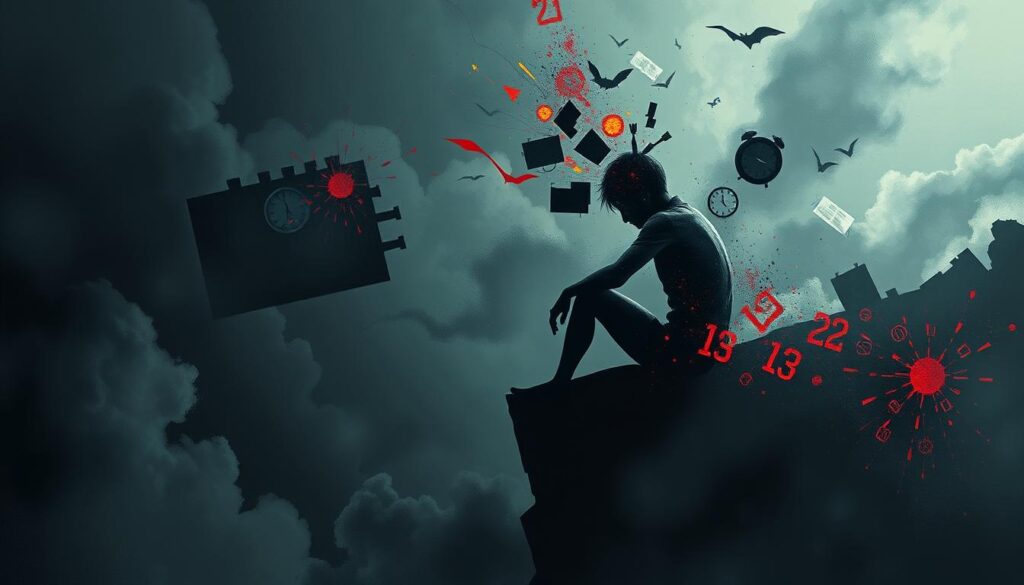A nervous breakdown can hit unexpectedly when life gets too much. Your mental health might be waving red flags that need quick action. These extreme burnouts can mess up your whole life1.
Mental health crises don’t just pop up. Long-term stress and unsolved emotional issues can push you to the edge. People in these tough spots often can’t handle daily life1.
Your body and mind send signals during a possible breakdown. Watch for trouble sleeping, constant tiredness, and avoiding people. Big mood swings are also a worry sign2.
If these signs stick around, it’s time to get help. Talking to a therapist or taking medicine can help you feel better. Sometimes, a mix of both works best2.
Key Takeaways
- Recognize early warning signs of emotional burnout
- Understand that a nervous breakdown is a serious mental health crisis
- Seek professional support when symptoms become persistent
- Practice stress management techniques regularly
- Prioritize mental health as critically as physical health
Understanding Nervous Breakdown: A Modern Mental Health Crisis
Mental health challenges are common in our fast-paced world. A nervous breakdown happens when stress overwhelms a person’s ability to cope. This can disrupt their entire life3.
What Defines a Mental Health Crisis
A mental health crisis occurs when psychological stress becomes too much to handle. It’s not a clinical diagnosis. Instead, it’s a state of severe emotional and physical exhaustion3.
Anxiety disorders and depression can greatly contribute to this overwhelming experience4.
Risk Factors and Common Triggers
- Work-related conflicts3
- Traumatic life events3
- Severe medical conditions
- Persistent stress environments
- Lack of social support
About 19.1% of adults experience anxiety disorders. These can lead to a potential mental health crisis5.
People with a family history of mental health issues might struggle more to cope5.
Impact on Daily Functioning
| Functional Area | Potential Disruption |
|---|---|
| Professional Performance | Decreased productivity |
| Social Interactions | Withdrawal and isolation |
| Personal Care | Difficulty maintaining routines |
Approximately 60% of individuals experiencing a mental health crisis struggle to perform everyday tasks5.
Developing good coping skills is key to managing mental health. Seeking professional help is also crucial in preventing a potential breakdown3.
Critical Warning Signs and Physical Symptoms
Spotting warning signs is vital when your mental health declines. A nervous breakdown can severely impact your daily life. It involves various physical and psychological symptoms6.
Panic attacks often signal mental distress. They involve intense fear, rapid heartbeat, and breathing difficulties. These episodes can feel overwhelming7.
Various factors can trigger panic attacks:
- Work-related stress
- Relationship challenges
- Traumatic life events
- Chronic health conditions
Physical symptoms can appear in different ways:
- Sleep disturbances: Insomnia or excessive sleeping
- Extreme fatigue (affecting 78% of individuals)
- Changes in appetite
- Persistent mood fluctuations
“Your body speaks volumes about your mental state before your mind fully comprehends the stress.”
Mindfulness techniques can help manage these symptoms. Cognitive behavioral therapy offers structured ways to understand and reduce intense experiences6.
Seek professional help if symptoms persist. Your mental health is important and deserves proper care7.
Conclusion
Understanding mental health crises is crucial for effective healing. Recognizing early symptoms and using coping strategies are key steps. Coping mechanisms for mental well-being vary based on individual needs8.
Build resilience through solid self-care practices. Manage stress by setting workplace boundaries and exercising regularly. Maintain open communication with your support network8.
Professional counseling and meditation can improve your recovery journey. Remember, asking for help shows courage, not weakness9.
Various resources are available to guide you. These include community health centers and online support groups. Your mental health journey is unique8.
With proper support, you can overcome challenging periods. Stay committed to your well-being and recovery9.
FAQ
What exactly is a nervous breakdown?
What are the primary warning signs of a nervous breakdown?
How long does a nervous breakdown typically last?
What are the main risk factors for experiencing a nervous breakdown?
When should I seek professional help?
What treatment options are available for a nervous breakdown?
Can a nervous breakdown be prevented?
What physical symptoms might accompany a nervous breakdown?
Source Links
- 9 Signs You Might Be Having a Nervous Breakdown—And What To Do About It – https://www.health.com/condition/anxiety/signs-of-a-nervous-breakdown
- Nervous breakdown: What does it mean? – https://www.mayoclinic.org/diseases-conditions/depression/expert-answers/nervous-breakdown/faq-20057830
- Nervous breakdown: Signs, symptoms, and treatment – https://www.medicalnewstoday.com/articles/321018
- Types of Nervous Breakdowns – https://www.bridgestorecovery.com/nervous-breakdown/types-nervous-breakdowns/
- Nervous Breakdown (Mental Health Crisis) – https://my.clevelandclinic.org/health/diseases/22780-nervous-breakdown
- Symptoms and Signs of a “Nervous Breakdown” – https://www.resiliencelab.us/thought-lab/nervous-breakdown
- Symptoms of a Nervous (Mental) Breakdown – https://www.healthline.com/health/mental-health/nervous-breakdown
- Nervous Breakdown vs. Burnout: What’s the Difference? – https://expresserharkerheights.com/blog/nervous-breakdown-vs-burnout-whats-the-difference/
- Nervous vs Mental Breakdowns: Are They the Same? – https://www.anxiousminds.co.uk/nervous-vs-mental-breakdowns/
